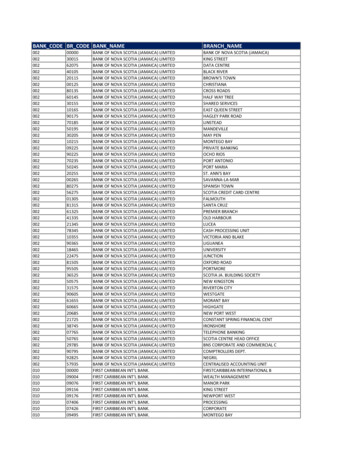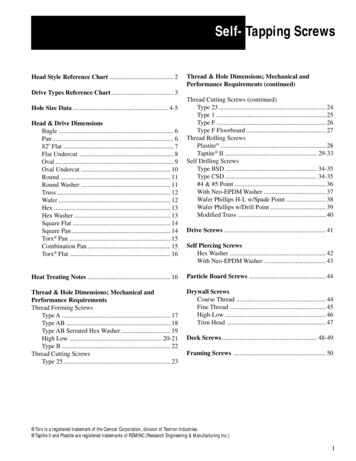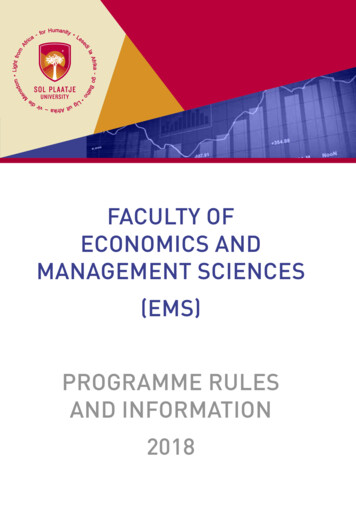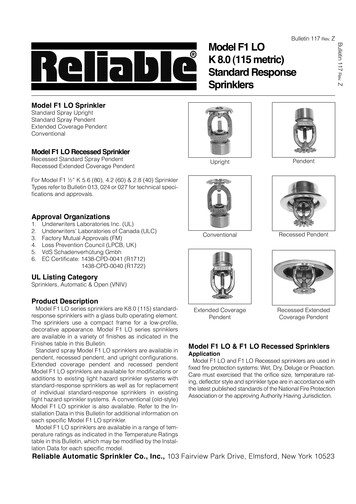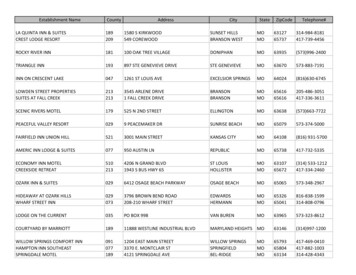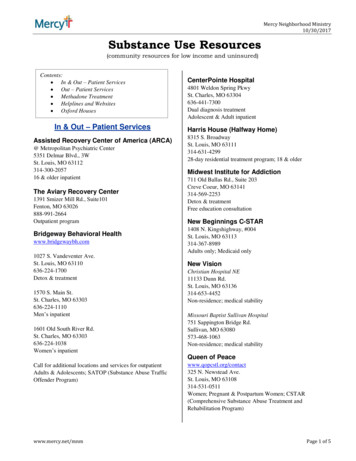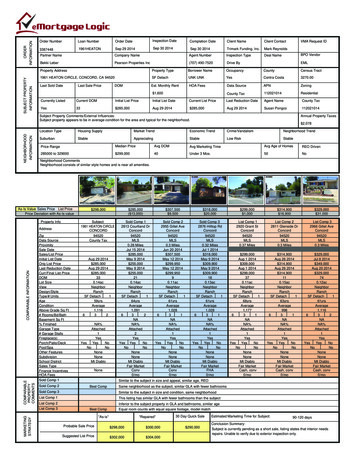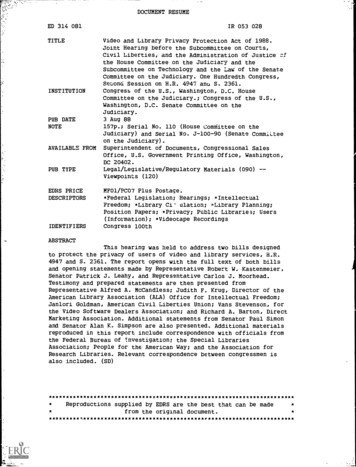
Transcription
DOCUMENT RESUMEED 314 081TITLEINSTITUTIONPUB DATENOTEAVAILABLE FROMPUB TYPEEDRS PRICEDESCRIPTORSIDENTIFIERSIR 053 028Video and Library Privacy Protection Act of 1988.Joint Hearing before the Subcommittee on Courts,Civil Liberties, and the Administration of Justice cfthe House Committee on the Judiciary and theSubcommittee on Technology and the Law of the SenateCommittee on the Judiciary. One Hundredth Congress,Sec:ond Session on H.R. 4947 ana S. 2361.Congress of the U.S., Washington, D.C. HouseCommittee on the Judiciary.; Congress of the U.S.,Washington, D.C. Senate Committee on theJudiciary.3 Aug 88157p.; Serial No. 110 (House Comiriittee on theJudiciary) and Serial No. J-100-90 (Senate CommiLteeon the Judiciary).Superintendent of Documents, Congressional SalesOffice, U.S. Government Printing Office, Washington,DC 20402.Legal/Legislative/Regulatory Materials (090)Viewpoints (120)MF01/PC07 Plus Postage.*Federal Legislation; Hearings; *IntellectualFreedom; *Library Ci- ulation; *Library Planning;Position Papers; *Privacy; Public Libraries; Users(Information); *Videotape RecordingsCongress 100thABSTRACTThis hearing was held to address two bills designedto protect the privacy of users of video and library services, H.R.4947 and S. 2361. The report opens with the full text of both billsand opening statements made by Representative Robert W. Kastenmeier,Senator Patrick J. Leahy, and Representative Carlos J. Moorhead.Testimony and prepared statements are then presented fromRepresentative Alfred A. McCandless; Judith F. Krug, Director of theAmerican Library Association (ALA) Office for Intellectual Freedom;Janlori Goldman, American Civil Liberties Union; Vans Stevenson, forthe Video Software Dealers Association; and Richard A. Barton, DirectMarketing Association. Additional statements from Senator Paul Simonand Senator Alan K. Simpson are also presented. Additional materialsreproduced in this report include correspondence with officials fromthe Federal Bureau of Investigation; the Special LibrariesAssociation; People for the American Way; and the Association forResearch Libraries. Relevant correspondence between congressmen isalso included. (SD)************ ********** ****** ** * *** **************** ******* ******* *********Reproductions supplied by EDRS are the best that can be madefrom the original document.**
p.4VIDEO AND LIBRARY PRIVACY PROTECTIONcoACT OF 1988motJOINT HEARINGoBEFORE THESUBCOMMITTEE ON COURTS, CIVIL LIBERTIES,ADMINISTRATION OF JUSTICEOF THEr74HOUSE COMMITTEE ON TH V, JUDICIARYAND THESUBCOMMITTEE ON TECHNOLOGY AND THE LAWOF THESENATE COMMITTEE ON Di JUDICIARYONE HUNDREDTH CONGRESSSECOND SESSIONONH.R. 4947 and S. 2361LIBRARY PRIVACY PROTECTION ACT OF 1988U.S. DEPARTMENT OF EDUCATIONOffice c4 Educatronal Research and UST 3, 1988lits,Thrs document has been reproduced asmewed from the person or organrtatron mutating rt.C Minor changes have been madeto reproveSerial No. 110reproduction ouairgyPants of wew or gluons stated m thogocumint do not necessarily represent MoralOERI posroon or policy'House Committer on theIdiCiary)Serial No. J-100-90(Senate Committee on the Judiciary)Printed for the use of the Committees cn the JudiciarytoO414U.S GOVERNMENT PRINTING OFFICEWASHINGTON : 198990-845 rFor sale by the Superintendent of Documents. Congressional Sales OfficeUS. Government Printing Office, Washington. DC 20402rnPV AVAWABLE2
HOUSE COMMITTEE ON THE JUDICIARYPETER W. RODINO, JR., New Jersey, ChairmanJACK BROOKS, TexasHAMILTON FISH, JR., New YorkROBERT W. KASTENMEIER, WisconsinCARLOS J. MOORHEAD, CaliforniaDON EDWARDS, CaliforniaHENRY J. HYDE, rilinoisJOHN CONYERS, JR., MichiganDAN LUNGREN, CaliforniaROMANO L MAMLI, KentuckyF. JAMES SENSENBFENNER, JR.,WILLIAM J. HUGHES, New JerseyWisconsinMIKE SYNAR, OklahomaBILL McCOLLUM, FloridaPATRICIA SCHROEDER, ColoradoGEORGE W. GEKAS, PennsylvaniaDAN GLICKMAN, KansasMICHAEL DEWINE, OhioBARNEY FRANK, MassachusettsWILLIAM E. DANNEMEYER, CaliforniaGEO. W. CROCIEEIT, JR., MichiganPATRICK L SWINDALL, GeorgiaCHARLES E. SCHUMER, New YorkHOWARD COBLE, North CarolinaBRUCE A. MORRISON, ConnecticutD. FRENCH SLAUGHTER, JR., VirginiaEDWARD F. FEIGHAN, OhioLAMAR S. SMITH, TexasLAWRENCE J. SMITH, FloridaHOWARD L BERMAN, CaliforniaRICK BOUCHER, VirginiaHARLEY 0. STAGGERS, JR., West VirginiaJOHN BRYANT, TexasBENJAMIN L CARDIN, Marylanda.M. ELAINE MIELICE, General CounselAWTHUR P. ENDARS, JR., Staff DirectorALAN F. COPPEY, JR, Associate CounselSUBCOMMITTEE ON COURTS, CIVIL LIR. .TICS, AND THE ADMINISTRATION OF JUSTICEROBERT W. KASI'ENMEIER, Wisconsin, ChairmanMIKE SYNAR, OklahomaCARLOS J. MOORHEAD, CaliforniaPATRICIA SCHROEDER, ColoradoHENRY J. HYDE, IllinoisGEO. W. CROCKEIT JR., MichiganDAN LUNGREN, CaliforniaBRUCE A. MORRLSON, ConnecticutMICHAEL DxWINE, PennsylvaniaHOWARD L BERMAN, CaliforniaHOWARD COBLE, North CarolinaRICK BOUCHER, VirginiaD. FRENCH SLAUGHTER JR., VirgthiaJOHN BRYANT, TexasBENJAMIN L CARDIN, MarylandMICHAEL J. REMINGTON, Chief CounselDAVID W. BEIER, Colt ISelVIRGINIA E. &DAN, CounselSUSAN L COSICEY, CounselTHOMAS E. Moorav, Associate CounselJOSEPH V. Wor.rz, Associate CounselaHI)3.1' :2: ':.
SENATE COMMITTEE ON THE JUDICIARYJOSEPH R. BIDEN, JR., Delaware, ChairmanSTROM THURMOND, South CarolinaEDWARD M. KENNEDY, MassachusettsORRIN G. HATCH, UtahROBERT C. BYRD, West VirginiaALAN K. SIMPSON, WyomingHOWARD M. METZENBAUM, Oh'oCHARLES E. GRASSLEY, IowaDENNIS DECONCINI, ArizonaARLEN SPECTER, PennsylvaniaPATRICK J. LEAHY, VermontGORDON J. HUMPHREY, New HampshireHOWELL HEFLIN, AlabamaPAUL SIMON, IllinoisMARK H. GrrENsrEnv, Chief CounselDIANA HUFFMAN, Staff DirectorDErmis W. SHEDD, Minority Chief CounselSUBCOMMITTEE ON TECHNOLOGY ANU THE LAWPATRICK J. LEAHY, Vermont, ChairmanGORDON J. HUMPHREY, New HampshireDENNIS DECONCINI, ArizonaANN M. HARKINS, Chief CounselGEORGE C. SMITH, Minority Chief Counsel
CONTENTSTEXT OF BILLSPage2H.R. 4947S. 23619OPENING STATEMENTSThe Honorable Robert W. Kastenmeier, a Representative in Congress fromthe State of Wisconsin; Chairman, Subcommittee en Courts, Civil Libertiesand the Administration of JusticeThe Honorable Patrick J. Leahy, a Senator from the State of Vermont;Chairman, Senate Subcommittee on Technology and the LawThe Honorable Carlos J. Mocrhead, a Representative in Congress from theState of California201825WITNESSESThe Honorable Alfred A. (Al) McCandless, a Representative in Congress fromtl.e State of CaliforniaPrepared statementJudith F. Krug, Director, Office for Intellectual Freedom, American LibraryAt sociation, Chicago, ILPrepared statementJanlori Goldman, Esq., Staff Attorney, Project on P:ivacy and Technology,American Civil Liberties Union, Washington, DCPrepared statementVans Stevenson, Director of Public Relations, Erol's, Inc., Springfield, VA; onbehalf of the Video Software Dealers Association, Marlton, NJPrepared statementRichard A. Barton, Senior Vice President, Direct Marketing Association,Washington, DCPrepared statement with attachment27283437343734783490ADDITIONAL STATEMENTSStatement of the Honorable Pau Simon, a Senator from the State of Illinois;Chairman, Senate Subcommittee on the ConstitutionStatement of the Honorable Alan K. Simpson, a Senator from the State ofWyoming131133ADDITIONAL MATERIALSInvitation to testify from the Honorable Patrick J. Leahy and the HonorablePeter W. Rodino, Jr., Chairman, Committee on the Judiciary, U.S. House ofRepresentatives, to the Honorable William S. Sessions, Director, FederalBureau of Investigation, July 26, 1988; lett. 3f response from Mr. Sessions126, 138to Mr. Rodino, August 2, 1988Letter from C. James Schmidt, Chair, Intellectual Freedom Committee, Officefor Intellectual Freedom, American Library Association, Chicago, IL; to the139Honorable Robert W. Kastenmeier, August 25, 1988Letter from Judith F. Krug to the Honorable Robert W. Kastenmeier,140September 23, 1988(V)
VILetter from David R. Bender, Ph.D., Executive Director, Special LibrariesAssociation, Washington, DC, to the Honorable Peter W. Rodino, Jr ,PageLetter from John H. Buchanan, Jr., Chairman, and Arthur J. Kropp, President, People for the American Way, Washington, DC, to the Honorable142Letter from Duane E. Vt deter, Executive Director, Association of ResearchLibraries, Washington, DC, to the Honorable Robert W. Kastenmeier,143Letter from the Honorable Robert W. Kastenmeier and the Hnnorable DonEdwards, Chairman, Subcommittee on Civil and Constitutional Rights, tothe Honorable Louis Stokes, Chrdrman, Permanent Select Committee onIntelligence, September 22, lqg8Letter from Thomas M. Boyd, Acting Assistant Attorney General, Office ofLegislative Affairs, U.S. Department o;* Justice, to the Honorable Robert W145September 26, 1988Robert W. Kastenmeier, October 3, 1988September 26, 1988Kastenmeier, September 27, 19881461486
VIDEO AND LIBRARY PRIVACY PROTECTIONACT OF 1988WEDNESDAY, AUGUST 3, 1988U.S.HOUSE OF REPRESENTATIVES, SUBCOMMITTEE ONCOURTS, CIVIL LIBERTIES, AND THE ADMINISTRATION OFJUSTICE, COMMITTEE ON THE JUDICIARY, AND U.S.SENATE, SUBCOMMITTEE ON TECHNOLOGY AND THE LAW,COMMITTEE ON THE JUDICIARY,Washington, DC.The subcommittees met, pursuant to notice, at 9:40 a.m., in room2237, Rayburn House Office Building, Hon. Robert W. Kastenmeier(chairman of the Subcommittee on Courts, Civil Liberties, and theAdministration of Justice) presiding.Present (House): Representatives Kastenmeier, Berman, Cardin,Moorhead, De Wine, Coble, and Slaughter.Present (Senate): Senators Leahy and Simon.Staff present (House): Michael J. Remington, chief counsel; Virginia E. Sloan, counsel; David W. Beier, counsel; Joseph V. Wolfe,associate counsel; and Judith W. Krivit, clerk.Staff present (Senate): Ann M. Harkins, chief counsel; Marc S.Rotenberg, counsel; Susan P. Kaplan, counsel; and Jill D. Friedman, clerk.Mr. KASTENMEIER. The meeting will come to order.[Copies of H.R. 4947 and S. 2361 follow:](1)
2I100T11 CONGRESS2D SESSIONH. R. 4947To amend title 18, Unitul States Code, to preserve personal privacy of individualswith respect to certain library use and use of services involving the rentalorpurchase of video tapes, and for other purposes.IN THE HOUSE OF REPRESENTATIVESJUNE 29, 1988Mr. KASTENMEIER (for himself and Mr. MCCANDLESS) introduced thefollowingbill; which was referred to the Committee on the JudiciaryA BILLTo amend title 18, United States Code, to preserve persona'privacy of individuals with respect to certain library use .nduse of services involving the rental or purchase of videotapes, and for other purposes.Be it enacted by the Senate and House of Representa2 fives of the United States of America in Congress (mumbled,13 SECTION 1. SHORT TITLE.4This Act may be cited as the "Video and Library5 Privacy Protection Act of 1988".6 SEC. 2. CHAPTER 121 AMENDMENT.(a) IN GENERAL.Chapter 121 of title 18, United8 States Code, is amended78
32(1) by redesignating section 2710 as section 2711;123and(2) by inserting after section 2709 the following:4 "§ 2710. Wrongful disclosure of information relating to li-brary use or video tape rental or sale56"(a) PROHIBIT.ONS.Except as provided in subsection7(b), it shall be unlawful for a video service provider or library8 knowingly9"(1) to disclose to any other person or entity any10personally identifiable information about any user of11covered services; or1213"(2) to retain in a record any such informationmore than one yearafter-14"(A) that information is no longer necessary15for the purposes for which it was collected; and16"(B) there are no pending requests or court1718orders fot disclosure under this section."(b) EXCEPTIONS.it is not a violation of sub-19 section (a) of this section to disclose information about an20 individual- 21"(1) to that individual;22"(2) with that individual's consent under the cir-23cumstances described in subsection (c) of this sPr3tion;24"(3) to a law enforcement agency pursuant to an25order under subsection (d) of this section; or
4312"(4) when necessary for a legitimate businesspurpose.3 For the purposes of this subsection, engaging in the conduct4 prohibited by subsection (a) is not in itself P legitimate busi-5 ness purpose.6"(c) REQUIREMENTS FOR CONSENT EXCEPTION.7"(1) IN GENERALExcept as provided in pars-8graph (2), the consent required for the exception under9subsection (b)(2) is the prior written consent of the10user-11"(A) specifying what information will be dis-12closed and who the specific recipient of that dis-13closure will be; and14"(B) given under the circumstances in which15the user understands that the user may prohibit16that disclosure without being refused services or17suffering other discrimination.18"(2) ALTERNATIVE CONSENT.In the case of a19disci sure limited to the name and address of the user,20that does not, directly or indirectly, reveal the category21of service, or the title, description, or subject matter of22service used, it is also sufficient consent for the pur-23poses of the exception under subsection (b)(2)2425that"(A) the provider has given the user an opportunity to prohibit such disclosure;10
541"(B) such opportunity is2"(i) in a writing which clearly and con-3spicuously specifies what information will be4disclosed; and5"(ii) under the circumstances described6in paragraph (1)(B); and7"(C) the user may exercise that opportunity8by making an appropriate mark on such writing.9"(d) REQUIREMENTS FOR COURT ORDER FOR LAW10 ENFORCEMENT EXCEPTION.j IN GENERALA court may order disclosure12of personally identifiable information about a user of13covered services to a Federal law enforcement agency14or a State law enforcement agency authorized by State15statute to seek such disclosure, if-16"(A) the user is given notice and afforded an17opportunity to appear and contest such order; and18"(B) tin law enforcement agency makes the19showing described in paragraph (2).20'(2) WHAT THE AGENCY MUST SHOW.In a21court proceeding to issue an order under this subsec-22Lion the law enforceme,d agency must show-2324"(A) by clear and convincing evidence thatthe user has engaged in criminal activity;1
651"(B) that the information sought would be2highly probative in a criminal proceeding relating3to that activity;4"(C) that other specifically named and less5intrusive investigative procedures have been tried6and failed, and the particular details of that at-7tempt and failure, or why the peculiar circum-8stances of this case make it reasonably appear9that other less intrusive investigative procedures10are unlikaly to succeed if tried or are too danger-11ous to try; and12"(II) why, in the particular and individual13circumstances of this case, the value of the infor-14mation sought outweighs the competing privacy15interests.16"(e) CIVIL REMEDY.Any person or entity (including a17 governmental entity) that violates subsection (a) shall be18 liable to any person aggrieved by that violation for-19202122"(1) such equitable and declaratory relief as maybe appropriate;"(2) actual damages, but not less than theliqui-dated amount of 2,500;23"(3) punitive damages in appropriate cases; and24"(4) reasonable attorneys' fees and other litigation25expenses reasonably incurred.12
761"(f) DEFINITIONS OF COVERED ENTITIES AND SERV-2 ICES.For purposes of this section3456"(1) the term 'video service provider or library'means"(A) any publicly owned library open to thegeneral public;"(B) any library in a primary, secondary, or8910post secondary education institution --"(i) that is a public institution; or"(ii) any part of which receives Federal11financial assistance;12"(C) any person or other entity engaging in13a business that includes the renting or selling of14prerecorded video tapes or similar audiovisual15materials that-1617"(i) operates in or affects interstate 'rforeign commerce; or18"(ii) is supplied with video tapes to rent19or sell through distributors that operate in20interstate or forth,21"(D) any person or other entity to whom c22disclosure is made under subsection (b)(4), but23only with respect to the information contained ;a24that disclosure; orcommerce;
871"(E) any person acting as an agent of an2entity described in subparagraphs (A) through (I)),3but only with respect to information obtained from4such entity; and5"(2) the term 'covered services'6means-"(A) with respect to a library, all the serv-7Ices of the library; and8"(B) with respect to a provider of prerecord-9ed video tapes or similar audiovisual materials,10those services involving or incident to providing11such tapes or materials.12"(g) PREEMPTION.The section preempts only those13 provisions of State or local law that require disclosure which14 this section prohibits.".15(b) CLERICAL AMENDMENT.The table of sections at16 the beginning of chapter 121 of title 18, United States Code,17is amended-18(1) in the item relating to section 2710, by strik-19ing out "2710" and inserting "2711" in lieu thereof;20and2122(2) by inserting after the item relating to section2709 the following new item:"2710. Wrongful disclosure of information relating to library use or video taperental or sale. ".14
9II100m CONGRESS2o sE.,0NS. 7'with respectTo amend title 18, United States Code, to preserve personal privacyvisualdeliveryofvideotapesorsimilaraudioto the rental, purchase, ormaterialsorservices.materials and the use of libraryIN THE SENATE OF THE UNITED STATESMAY 10 (legislative Jay, MM 9), 1988introMr. LEanY (for himself, Mr. GRASSLEY, Mr. SIMON, and Mr. Sim nos)Committeereadtwiceandreferredtotheduced the following bill; which wason the JudiciaryA BILLTo amend title 18, United States Code, to preserve personalprivacy with respect to the rental, purchase, or delivery ofvideo tapes or similar aud; visual materials and the use oflibrary materials or services.1Be it enacted by the Senate and House of Representa-2 lives of the United Slates of America in Congress assembled,3 SECTION 1. SHORT TITLE.4This Act may be cited as the "Video and Library5 Privacy Protection Act of 1988".6 SEC. 2. CHAFFER 121 AMENDMENT.7(a) IN GENERAL.Chapter 121 of title 18, United8 States Code, is amended
10212(1) by redesignating section 2710 as section2711;and3(2) by inserting fter section 2709 thefollowing:4 "112710. Wrongful disclosure of video tape rentalor sale5records and library r ecords6"(a) DEFINITIONS.For plaposes of this section --7"(1) the term 'patron' means any individual whorequests or receives-8"(A) services within a library; or131011"(B) books or other materials on loan from alibrary;12"(2) the term 'consumer means any renter, pur-13chaser, or subscriber of goods or services from a video14tape service provider;15"(3) the term 'library' means an institution which16operates as a public library or serves as a library for17any university, school, or college;18"(4) the term 'ordinary course of business' meansonly debt collection activities and the transfer of192021ownership;"(5) the term 'personally identifiable information'22includes information which identifies23having requested or obtained specific materialsor services from a video tape service provider or library; and2416a person as
1131"(6) the term eider tape service provider' means2any person, engaged in the business of rental, tale, or3delivery of pre-recorded video cassette tapes or s:milar4audio visual materials.5"(b) VIDEO TAPE RENTAL AND SALE RECORDS.-(1)6 A video tape service provider who knowingly discloses, to7 any person, personally identifiable information concerning8 any consumer of such provider shall be liable to the ag9 grieved person for the relief provided in subsection (d).10"(2) A N ideo tape service provider may disclose person-11 ally identifiable information concerning any consumer12"(A) to the consumer;13"(B) to ,ny person with the informed, written14consent of the consumer given at the time the disclo-15sure is sought;1617"(C) to a law enforcement agency pursuant to acourt order authorizing such disclosure if-18"(i) the consumer is given reasonable notice,19by the law enforcement agency, of the court pro-20ceeding relevant to the issuance of the court order21and is afforded the opportunity to appear and con-22test the claim of the law enforcement agency; and23"(ii)such law enforcement agency offers24clear and convincing evidence that the subject of25the information is reasonably suspected of engag-17
1241ing LI criminal activity and the information sought2is highly probative and material to the ease;3"(11)! to any person if the disclosure is solely of4the names and addresses of consumers and if-5"(i) the video tape service provider has pro-6vided the consumer with the opportunity, in a7writing separate from any rental, sales, or sub-8scription agreement, to prohibit such disclosure;9and10"(ii) the disclosure does not reveal, directly11or indirectly, the title, description, or subject12matter of any video tapes or other audio visual13material;14"(E) to any person if the disclosure is incident to15the ordinary course of business of the video tape serv-16ice provider; or17"(F) pursuant to a court order, in a civil proceed-18ing upon a showing of compelling need for the informa-19tion that cannot be accommodated by any other means,20if-21"(i) the consumer is given reasonable notice,22by the person seeking the disclosure, of the court23proceeding relevant to the issuance of the court24order; and1E
1351"(ii) the consumer is afforded the opportunity2to appear and contest the claim of the person3seeking the disclosure.4 If an order is granted pursuant to subparagraph (C) cr (F),5 the court shall impose appropriate safeguards against unau6 thorized disclosure.7"(c) LIBRARY RECORDS.-(1) Any library which know-8 ingly discloses, to any person, personally identifiable informs-9 tion concerning any patron of such institution shall be liable10 to the aggrieved person for the relief provided in subsection11 (d).12"(2) A library may disclose personally identifiable infor-13 mation concerning any patron14"(A) to the patron;15"(B) to any person with the informed written con-16sent of the patron given at the time the disclosure is17sought;1819"(C) to a law enforcement agency pursuant to acourt order authorizing such disclosure if-20"(i) the patron is given reasonable notice, by21the law enforcement agency, of the court proceed-22ing relevant to the issuance of the court order and23is afforded the opportunity to appear and contest24the claim of the law enforcement agency; and19
146"(ii)1such law enforcement agency offers2clear and convincing evidence that the subject of3the information is reasonably suspected of engag-4ing in criminal activity and that the information5sought is highly probative and material to the6case;7"(D) to any person if the disclosure is solely of8the names and addresses of patrons and if-9"(i) the library has provided the patron with10a written statement which affords the patron the11opportunity to prohibit such disclosure; and12"(ii) the disclosure does not reveal, directly13or indirectly, the title, description, or subject14matter of any library materials borrowed or serv-15ices utilized by the patron;16"(E) to any authorized person if the disclosure is17necessary for the retrieval of overdue library materials18or the recoupment of compensation for damaged or lost19library materials; or20"(F) pursuant to a court order, in a civil proceed-21ing upon a showing of compelling need for the informa-22lion that cannot be accommodated by any other means,23if-20
1571"(i) the patron is given reasonable notice, by the2person seeking the disclosure, of the court proceeding3relevant to the issuance of the court order; and4"(ii)the patron is afforded the opportunity to5appear and contest the claim of the person seeking the6disclosure.7 If an order is granted pursuant to subparagraph (C) or (F),8 the court shall impose appropriate safeguards against unau9 thorized disclosure.10"(d) Crvii ACTION.--(1) Any person aggrieved by any11 act of a person in violation of this section may bring a civil12 action in a United Stales district court.1314"(2) The court may award"(A) actual damages but not less than liquidated15damages in an amount of 2,500;16"(B) punitive damages;17"(C) reasonable attorneys' fees and other litiga-1819tion costs reasonably incurred; and"(D) such other preliminary and equitable relief as20the court determines to be appropriate.21"(3) No rction may be brought under this subsection22 unless such action is begun within 2 years from the date of23 the act complained of or the date of discovery.24"(4) No liability shall result from lawful disclosure per-25 witted by this section.
1681"(e) Personally identifiable information obtained in any2 manner other than as provided in this section shall not be3 received in evidence in any trial, hearing, arbitration,or4 other proceeding in or before any court, grand jury, depart-5 ment, officer, agency, regulatory body, legislative committee,6 or other authority of the United States, a State, or a political78subdivision of a State."(f) DESTRUCTION OF OLD RECORDS. --Aperson sub-9 ject to this section shall destroy personally identifiable infor10 mation as soon as practicable, but no later than one year11from the date the information is no longer necessary for the12 purpose for which it was collected and there are no pending13requests or orders for access to such information under sub-14sections (b)(2) or (c)(2) or pursuant to a court order.15"(g) SELECTION OF A FORUM. ---Nothing in this section16shall limit rights of consumers or patrons otherwise provided17 under State or local law. A Federal court shall, in accord18 ante with scction 1738 of title 28, United States Code, give19 preclusive effect to the decision of any State or local court or20 agency in an action brought by a consumer or patron under a21 State or local law similar to this section. A decision of a22 Federal court under this section shall preclude any action23 under a State or local law similar to this section.".22
1791(b) CLERICAL AMENDMENT. The table of sections at2 the beginning of chapter 121 of title 18, United States Code,3 is amended4(1) in the item relating to section 2710, by strik-5ing out "2710" and inserting "2711" in lieu thereof;6and78(2) by inserting after the item relating to section2709 the following new item:"2710. Wrongful disclosure of video tape rental or sale records and libraryrecords.".
18Mr. KASTENMEIER. Today I am pleased that the Subcommittee onCourts, Civil Liberties, and the Administration of Justice joins withthe Senate Judiciary Committee Subcommittee on Technology andthe Law to hold a hearing on H.R. 4947 and S. 2361, bills to protectthe privacy of users of video and library services.Without objection, by unanimous consent, this meeting may becovered in whole or part by television and/or radio broadcast and/or still photography pursuant to Rule 5 of the Committee rules.Before making any opening statement, I would like to turn to thedistinguished Chairman of the Subcommittee on Technology andthe Law, Senator Pat Leahy, for his opening remarks.Mr. LEAHY. Mr. Chairman, I appreciate that and the courtesy ofyou letting me go first.As I mentioned, we have a vote that is going to occur very quickly in the SenE.te and I will cut out for a few minutes and do thatand come back.I am pleased to be here for this joint hearing of the Senate Judiciary Committee's Subcommittee on Technology and the Law andthe House Judiciary Committee's Subcommittee on Courts, CivilLiberties, and the Administration of Justice.I want to compliment you, sir, for the leadership you haveshown, not only in this subject but in so many that I have had thehonor of working with you on over the past several years on everyarea from privacy to high technology issues.It has been a pleasure and it is an honor for me to be able tocome over here and join you in what's a much nicer hearing roomthan we have over on the other side. There's better lighting.Today, we are considering the Video and Library Privacy Protection Act. That is legislation that on the Senate side, I introducedwith Senators Simon, Simpson and Grass ley. And you, Mr. Chairman, and Congressman McCandless introduced companion legislation here.Judge Bork's confirmation he,:rings last year really provided theforum for a national civics lesson. From Vermont to California,Americans exchanged their views on our system of government. Nolesson from those hearings affected us more personally or deeplythan the debate on the right to privacy.Vermonters certainly let me know where they stood when reporters obtained a list of the movies that Judge Bork and hisfamily rented and they published them in a Washington newspaper. It was disturbing to see that personal information can be fairgame for reporters or lawyers or nosy neighbors.Most of us rent movies at video stores and we check out booksfrom our community libraries. These activities generate an enormous report of personal activity that, if it is going to be disclosed,makes it very, very difficult for a person to protect his or her privacy.It really isn't anybody's business what books or what videossomebody gets. It doesn't make any difference if somebody is up forconfirmation as a Supreme Court Justice or they are running thelocal grocery store. It is not your business. It is not my business. Itis not anybody else's business, whether they want to watch Disneyor they want to watch something of an entirely different nature. Itreally is not our business.24
19And if we are going to tell people, especially people who want tobe in any form of public life, well, if you do, we are going to go allthe sk,.y back and find out what you checked out at your public library, what you took out on videos or what you watch at night ontelevision programs, then we are in a sorry state.What a people's philosophy is, whether they are honest, whetherthey have integrity, those are valid questions for public office.Whether you wan
Letter from Duane E. Vt deter, Executive Director, 143 Association of Research Libraries, Washington, DC, to the Honorable Robert W. Kastenmeier, September 26, 1988 Letter from the Honorable Robert W. Kastenmeier and the Hnnorable Don 145 Edwards, Chai
